Understanding and Navigating the Level 1 Criminal Background Check Process
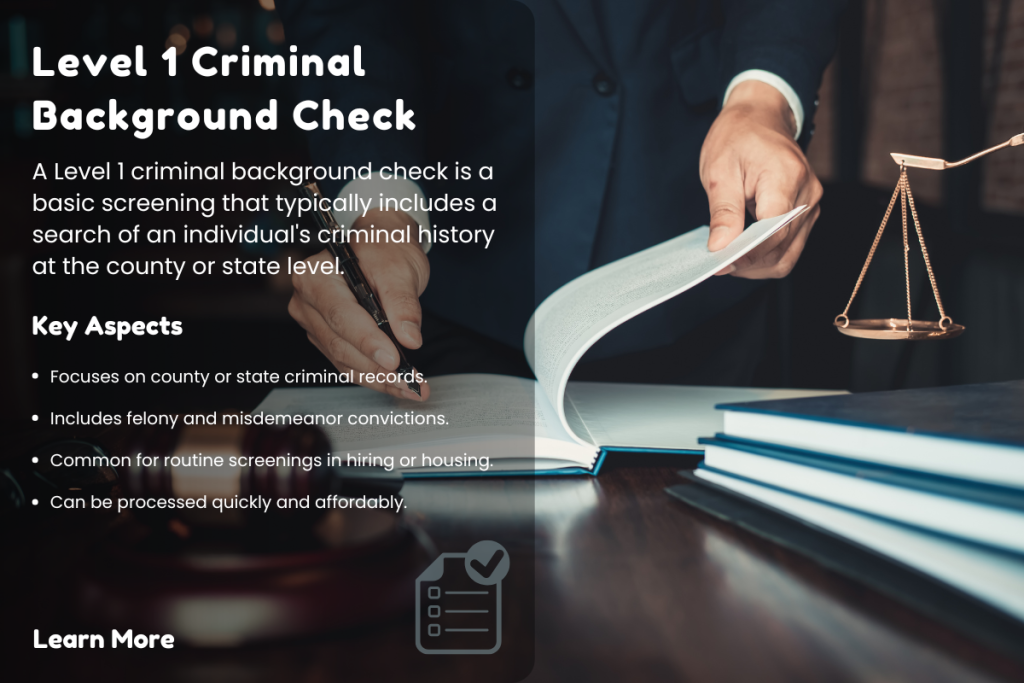
[et_pb_section admin_label=”section”]
[et_pb_row admin_label=”row”]
[et_pb_column type=”4_4″][et_pb_text admin_label=”Text”]
Introduction to Level 1 Criminal Background Check
A Level 1 Criminal Background Check is a standard process for reviewing an individual’s criminal history. It is typically used to identify convictions, arrest records, and pending charges that may be available through state or national databases. This type of background check is the most basic level of scrutiny and is often employed by employers, landlords, licensing authorities, and other entities to screen individuals for various purposes, including employment, housing, and security clearances.
Unlike Level 2 and Level 3 checks, which dive deeper into the individual’s history (often requiring fingerprinting and inclusion of federal records), Level 1 checks focus on publicly available information and are more streamlined. The core purpose of a Level 1 check is to provide a preliminary review of criminal records, giving organizations a quick yet reliable assessment of an individual’s history, especially when deeper investigations aren’t required.
Defining Level 1 Background Checks
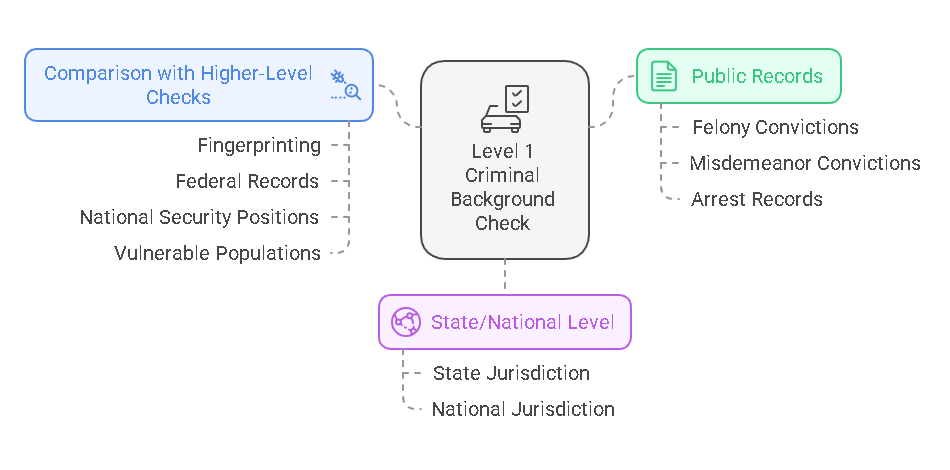
A Level 1 Criminal Background Check is often the first step in evaluating an individual’s criminal background. This type of check is primarily concerned with the public records of criminal activity, including any felony or misdemeanor convictions, and sometimes arrest records. The check is typically conducted at the state or national level, depending on the region in which the background check is being conducted.
Level 1 checks are different from higher-level background checks in that they do not include more thorough investigations, such as fingerprinting or checking federal criminal records. These additional checks are generally reserved for situations requiring deeper scrutiny, such as when someone is applying for a position involving national security or working with vulnerable populations like children or the elderly.
Why Level 1 Criminal Background Checks Matter
Level 1 criminal background checks are integral in various sectors because they help employers, landlords, and licensing authorities ensure that they are making informed decisions. Here are a few reasons why these checks are important:
- Employment: Employers use Level 1 background checks to assess the criminal history of job applicants, which helps protect both the company and its employees. For positions that involve handling sensitive information or working with vulnerable populations, knowing an applicant’s criminal history can be crucial.
- Housing: Landlords and property management companies commonly use these checks to screen potential tenants. A Level 1 background check can reveal any criminal history that might make an applicant ineligible for renting an apartment or house.
- Licensing: Certain professions, such as those in the financial services or healthcare industry, require a criminal background check as part of the licensing process. A Level 1 check is often sufficient for evaluating a person’s eligibility for these professions.
How Level 1 Criminal Background Checks are Performed
Level 1 criminal background checks are conducted by various entities, including government agencies and third-party services. The process begins with the submission of personal information by the individual requesting the check. Information such as the applicant’s full name, date of birth, and current address are usually required to complete the search.
The check itself is generally conducted through a national or state-level criminal database. The results are then compiled and presented to the requesting party, usually in the form of a report detailing the individual’s criminal history.
The typical timeframe for completing a Level 1 criminal background check can vary, but it usually takes anywhere from a few days to a week, depending on the jurisdiction and the complexity of the information involved.
What Information is Included in a Level 1 Check
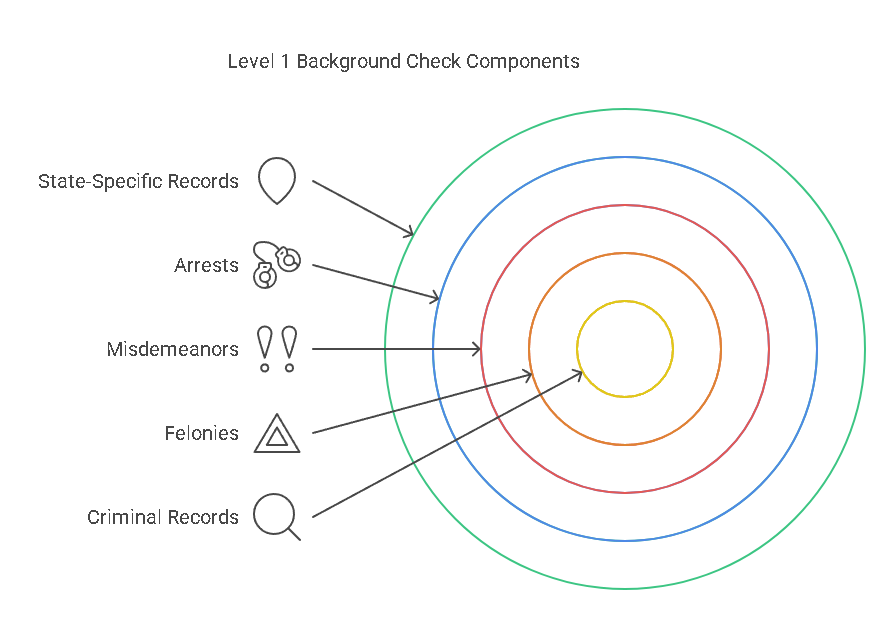
A Level 1 criminal background check can provide important information about an individual’s criminal history, including the following:
- Felonies: Any felony convictions will appear in the results of the Level 1 check. Felonies are the most serious type of crime and can have a significant impact on an individual’s eligibility for certain jobs or housing opportunities.
- Misdemeanors: In addition to felonies, misdemeanors, which are less serious but still significant offenses, will also be included in the Level 1 check. These may include offenses like petty theft or simple assault.
- Arrests: In some cases, arrests without a conviction may appear on a Level 1 check. However, this can depend on the jurisdiction and the rules regarding public record accessibility in that state.
- State-Specific Records: Since Level 1 checks are typically conducted at the state level, the records retrieved will be specific to that state. For example, someone with a criminal record in California may not have that record show up in a Level 1 check conducted in another state, unless that information is accessible through national databases.
Limitations of a Level 1 Criminal Background Check
While a Level 1 check is valuable, it is important to note its limitations:
- Sealed or Expunged Records: Certain criminal records, such as those that have been sealed or expunged by the court, may not appear in a Level 1 check. These records are typically hidden from public view to allow individuals a fresh start after serving their sentence or meeting certain criteria.
- Federal Offenses: Level 1 checks typically do not include federal records, which means if a person has committed a federal crime, such as drug trafficking or fraud, these records may not appear unless the background check is expanded to include federal databases.
Where a Level 1 Check is Commonly Used
Level 1 criminal background checks are used in a variety of scenarios, including:
- Employment Screening: Employers frequently use Level 1 checks to evaluate potential hires, particularly for positions that do not require extensive background investigations. This includes jobs in retail, customer service, or administrative roles.
- Tenant Background Checks: Landlords and property management companies commonly use Level 1 checks to assess whether an applicant has a criminal history that could pose a risk to other tenants or the property itself.
- Licensing Requirements: Some licensing authorities, particularly those involved in child care, financial services, or healthcare, may use Level 1 checks as part of the process to determine an applicant’s suitability for a specific role or license.
- Volunteer Positions: Organizations that engage volunteers may conduct Level 1 checks to ensure that those volunteering for certain roles, such as working with children, have no criminal background that could disqualify them.
Key Differences Between Level 1 and Other Levels of Background Checks
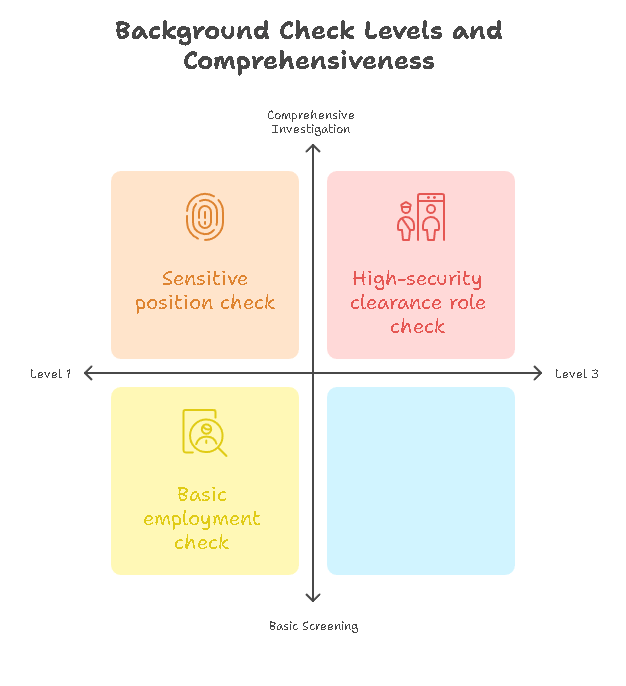
While a Level 1 check is useful for many basic screening purposes, it is not as comprehensive as other background checks. Here are the key differences between Level 1, Level 2, and Level 3 checks:
- Level 2 Criminal Background Checks: Typically require fingerprinting and are used for more sensitive positions. Level 2 checks include state and federal databases, offering a more detailed investigation than a Level 1 check.
- Level 3 Criminal Background Checks: Even more comprehensive than Level 2, Level 3 checks may include additional steps, such as interviews, national database queries, and thorough federal criminal history searches. These are often used in high-security clearance roles.
- Scope: A Level 1 check is limited to state and national databases and typically does not include fingerprinting or federal records. By contrast, Level 2 and Level 3 checks may incorporate additional data and investigative measures.
Step-by-Step Process for Obtaining a Level 1 Criminal Background Check
A Level 1 Criminal Background Check is a commonly used method for evaluating an individual’s criminal history and is often employed in employment screening, tenant background checks, and other scenarios requiring an evaluation of an applicant’s background. Understanding the process involved in obtaining a Level 1 check is crucial for both individuals requesting the check and organizations utilizing it for their operations. Below is a comprehensive guide to the process, covering everything from the information required to how the results are reviewed and used.
1. Submitting Personal Information
To initiate a Level 1 Criminal Background Check, the individual requesting the check (whether it’s an employer, landlord, or the individual themselves) must provide basic personal information. This typically includes:
- Full Name: The applicant’s complete legal name as it appears on government-issued documents.
- Date of Birth: This is critical for identifying the individual and distinguishing them from others with similar names.
- Address: The individual’s current address is often required, as it helps ensure the information in the database matches the person in question.
- Other Identification Details: Some services may also ask for other identifying information, such as social security numbers or driver’s license numbers, to confirm identity.
Providing accurate and up-to-date personal details is essential to ensure that the criminal background check returns accurate and comprehensive results.
2. Requesting the Report
A Level 1 Criminal Background Check can be requested by various parties for a variety of reasons. Typically, the requestor can be an:
- Employer: When conducting background checks for prospective employees.
- Landlord: When screening potential tenants to assess their suitability for rental properties.
- Government Agency: For security clearance or other regulatory requirements.
- Individual: Individuals can also request their own background check, either for personal peace of mind or to ensure that all the information about them is accurate before they are subjected to a check in employment or housing situations.
While some services allow direct individuals to request their own reports, employers or landlords often work with background check companies or third-party agencies to conduct the check on their behalf.
3. Processing the Request
Once the personal information is submitted, the request is processed through the relevant databases. A Level 1 Criminal Background Check typically involves searching state or national criminal databases. These databases contain criminal records such as:
- Felony Records: These are more severe criminal offenses that carry heavier penalties, such as prison time.
- Misdemeanor Records: Less severe crimes, often resulting in fines or short-term imprisonment.
- Arrest Records: This may include records of individuals who have been arrested but may not necessarily have been convicted.
The background check service will search state criminal records (depending on the state) and national databases to provide the most relevant and up-to-date information regarding an individual’s criminal history.
4. Reviewing the Results
After the request is processed and the data is retrieved, the results are compiled and presented to the requesting party. Typically, the results will include a detailed report of any criminal history found. The information included in this report can be extensive, depending on the type of offense and the jurisdiction, and will often highlight:
- Felony convictions: Details of any felonies, including the offense committed, the conviction date, and sentencing information.
- Misdemeanors: Misdemeanors may also be listed if they are relevant to the requested background check.
- Arrest records: These may include arrest information even if no conviction occurred, although they may be subject to state laws about how long these records are retained or shared.
The results are typically presented in a clear format, allowing the requester to make an informed decision based on the available criminal history data. However, certain limitations exist as to the types of offenses included in a Level 1 check, and this will be discussed further below.
5. Final Decision
Once the background check results are reviewed, the final decision is made by the requesting party. In an employment context, for example, an employer may decide whether or not to extend an offer based on the applicant’s criminal record. In housing scenarios, a landlord may determine whether a potential tenant is suitable for renting a property based on their criminal history.
It’s important to note that decision-making should be in compliance with relevant laws and regulations. For example, employers must ensure that they follow the Fair Credit Reporting Act (FCRA) when making decisions based on background checks, and landlords must adhere to Fair Housing Act regulations.
Level 1 Check vs. Other Types of Criminal Checks
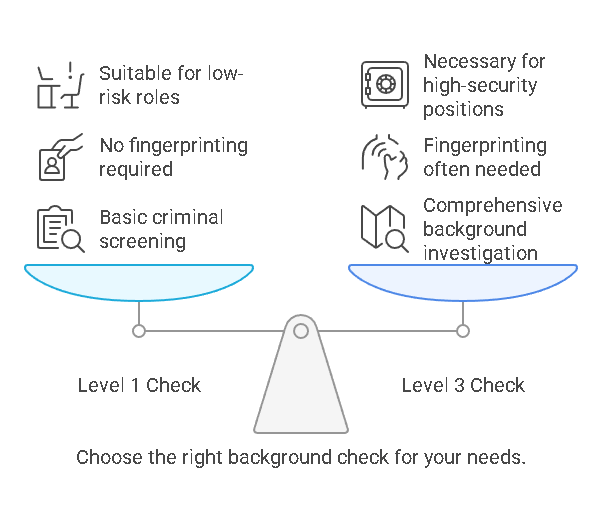
A Level 1 Criminal Background Check is often the first step in assessing an individual’s criminal history. However, there are other levels of background checks that offer varying degrees of depth and scrutiny. Below is a comparison of Level 1 with Level 2 and Level 3 checks.
Level 1 vs. Level 2
- Scope: A Level 2 check typically includes both state and federal criminal records and may require fingerprint verification to ensure the accuracy of the background check. In comparison, Level 1 checks are typically limited to state or national databases, meaning they may not capture federal criminal history.
- Fingerprinting: While Level 1 checks do not require fingerprinting, Level 2 checks often involve fingerprinting for more in-depth verification.
- Common Uses: Level 2 checks are often required for jobs in healthcare, finance, and childcare, where a more detailed understanding of an individual’s criminal history is necessary to ensure safety.
Level 1 vs. Level 3
- Scope: Level 3 checks are the most comprehensive and include not only state and national databases but also federal criminal records. They may also include additional databases, such as databases for registered sex offenders.
- Purpose: These checks are often required for high-security positions, such as those requiring government security clearance or roles in sensitive industries.
- Complexity: Level 3 checks are the most detailed, often including interviews or extensive investigations into an individual’s background.
In general, Level 1 checks are sufficient for basic criminal background screening, such as when hiring employees for roles that don’t require highly sensitive information. However, employers and landlords must understand when a more comprehensive check might be needed.
How Employers Use Level 1 Criminal Background Checks
Employers often use Level 1 Criminal Background Checks as part of their hiring process. These checks help assess whether a candidate’s criminal history could affect their eligibility for the job. The following explains how employers use Level 1 checks to make informed hiring decisions.
Employment Screening
When employers conduct a Level 1 background check, they are looking for any criminal history that might pose a risk to the company. For example, an employer may want to know if a candidate has any previous convictions related to theft, fraud, or violence, especially if the job involves handling sensitive information, managing money, or working in public safety.
Hiring Decisions
The results of the Level 1 check play a crucial role in the hiring decision. If the report reveals that a candidate has been convicted of crimes that are deemed relevant to the job (e.g., theft for an employee working in finance), the employer may decide not to move forward with the hiring process. On the other hand, a clean record may work in favor of the applicant.
Employers must be cautious when using criminal background checks in the hiring process, as there are legal limitations on how such information can be used. For instance, under the Ban the Box laws, employers cannot inquire about criminal history on job applications in certain states. They can only ask once the applicant is given a conditional offer.
Legal Limitations
Employers must adhere to the Fair Credit Reporting Act (FCRA) when using background checks for employment purposes. The FCRA regulates how the information obtained through background checks can be used, and it mandates that employers notify applicants if a check is being conducted. It also requires that applicants give consent before any checks are made.
Tenant and Housing Use Cases
A Level 1 Criminal Background Check is frequently used in tenant screening to help landlords evaluate whether an applicant poses a risk to the property or the community. Below are some common ways Level 1 checks are used in housing situations.
Landlord Use of Level 1 Checks
Landlords often use Level 1 checks to assess the criminal background of potential tenants. This process allows landlords to identify applicants with a criminal record, which may influence their decision to rent. For example, a landlord may be hesitant to rent to someone with a history of violent crime or drug offenses due to safety concerns.
In many cases, Level 1 checks focus on felony convictions and misdemeanors that are directly relevant to the rental property. However, landlords must ensure they comply with Fair Housing Act regulations, which prevent discrimination based on certain criminal records. For example, tenants with past drug convictions cannot automatically be disqualified from housing under certain circumstances.
Renting with a Criminal Record
For individuals with a criminal record, renting a home can be more challenging. A Level 1 check might reveal a past conviction, which could affect a tenant’s ability to secure housing. However, some states have regulations in place that limit the types of criminal history that landlords can consider, and the time that must pass before a criminal conviction can be considered when making a rental decision.
Many jurisdictions have enacted “Ban the Box” laws that prevent landlords from asking about criminal history until later in the application process. Additionally, tenants who feel they have been unfairly discriminated against based on their criminal record may have recourse to challenge the landlord’s decision.
Precisehire Services
Precisehire offers comprehensive criminal background screening services, including Level 1 Criminal Background Checks, to help employers, landlords, and other organizations ensure that they are making informed decisions when hiring or renting. The platform makes it easy to request and obtain accurate, up-to-date reports from state and national criminal databases.
Precisehire’s services extend beyond simply providing reports. The platform helps users navigate the complexities of legal compliance, ensuring that employers and landlords are following all relevant laws, such as the Fair Credit Reporting Act (FCRA) and Fair Housing Act.
Precisehire helps organizations streamline the background check process by offering both automated and customized solutions for background screenings. Whether for a hiring process, tenant screening, or other needs, Precisehire ensures that organizations can access the necessary criminal records quickly, accurately, and legally.
Data Table: Key Comparisons Between Level 1, Level 2, and Level 3 Criminal Background Checks
| Feature | Level 1 Check | Level 2 Check | Level 3 Check |
|---|---|---|---|
| Scope of Check | State and national databases | State, national, and federal databases | State, national, federal, and additional databases |
| Fingerprinting | Not required | Required for in-depth background verification | Often required for high-security positions |
| Types of Crimes Reported | Felonies, misdemeanors, and arrest records | Felonies, misdemeanors, federal crimes, and arrests | Full criminal history, including federal and state offenses |
| Common Uses | Employment, housing, and basic licensing | Jobs requiring deeper screening (e.g., child care, financial services) | High-security jobs, government clearance, sensitive industries |
Legal Considerations for Level 1 Criminal Background Checks
Level 1 Criminal Background Checks are an essential tool for employers, landlords, and other entities to assess an individual’s criminal history, especially when determining whether they are suitable for a role, rental, or other responsibilities. However, while they serve as a helpful screening tool, their use is governed by numerous laws and regulations designed to protect individual rights and ensure fairness in decision-making processes. Below are some of the key legal considerations when using a Level 1 criminal background check.
1. Fair Credit Reporting Act (FCRA)
The Fair Credit Reporting Act (FCRA) is a federal law that regulates how background checks, including criminal background checks, can be used in employment and housing decisions. The FCRA’s main purpose is to protect individuals from inaccurate or unfair use of their personal information in decisions that could impact their employment or housing prospects.
- Consent: Before conducting a Level 1 criminal background check, the requesting party (employer, landlord, etc.) must obtain the individual’s consent. This consent is typically given through a signed disclosure form.
- Adverse Action: If an employer or landlord decides not to hire or rent to an individual based on information found in the Level 1 check, they must follow the FCRA’s adverse action procedures. This includes notifying the individual about the negative action and providing them with a copy of the background check report, allowing the individual to dispute any inaccuracies in the findings.
- Accuracy: The FCRA also ensures that any background check is accurate and up-to-date. If the information provided in the check is incorrect, the individual can dispute the findings with the background check company or the entity that submitted the report.
By enforcing these guidelines, the FCRA ensures that Level 1 criminal background checks are used in a fair and transparent manner, preventing individuals from being unjustly disqualified from housing or employment opportunities.
2. State and Local Laws
While the FCRA provides federal guidelines for the use of background checks, state and local laws can also impose additional regulations or restrictions on the use of criminal background checks. These laws can vary significantly from state to state, and understanding these local regulations is critical when conducting a Level 1 check.
- Ban the Box: Many states and cities have passed Ban the Box laws, which prohibit employers from asking about an applicant’s criminal history on job applications. This law is designed to give applicants with criminal records a fairer chance at employment by ensuring their application is considered based on their qualifications rather than their past. In some jurisdictions, Ban the Box laws also apply to housing applications.
- Expungement Laws: Certain offenses can be expunged (removed) from an individual’s criminal record under specific conditions, such as after a certain number of years without reoffending. These laws vary by state, and a Level 1 check may not report these expunged records, as they are legally sealed. However, in some cases, employers and landlords may still request the individual to disclose their expunged records, depending on local laws.
- Time Limits: Some states have time limits on how far back a criminal background check can report. For example, certain criminal offenses may only be considered for a set number of years after the conviction, after which the records can no longer be used in decision-making.
It is essential for employers, landlords, and others conducting Level 1 criminal background checks to be aware of the state and local regulations in place to ensure they comply with all legal requirements.
3. Tenant Rights
The use of criminal background checks by landlords has specific legal implications that protect tenants and prospective tenants. Tenant rights regarding criminal background checks vary from jurisdiction to jurisdiction, but several key points should be noted.
- Discrimination Prohibition: The Fair Housing Act prohibits landlords from discriminating against applicants based on certain protected characteristics, such as race, color, religion, sex, familial status, national origin, and disability. In some cases, a criminal background check may be considered discriminatory if it disproportionately impacts certain racial or ethnic groups. For instance, using criminal history as an automatic disqualification for housing without considering the context may be seen as discriminatory.
- Rehabilitation: Some jurisdictions provide protections for tenants with a criminal history who have demonstrated rehabilitation. For example, individuals who have completed a rehabilitation program or have been crime-free for a specified number of years may be eligible for housing, even if they have a criminal record.
- Tenant Disputes: If a tenant feels that the information in a criminal background check is incorrect or discriminatory, they have the right to dispute the findings with the landlord. In some states, tenants are also allowed to request a copy of the criminal report that was used to make the decision.
Understanding tenant rights is crucial for landlords conducting Level 1 checks. They must navigate the process in a way that is both legal and respectful of individual rights.
4. Employment Discrimination Laws
In addition to the FCRA and state laws, employment discrimination laws play a vital role in how criminal background checks are used in hiring decisions. The Equal Employment Opportunity Commission (EEOC), which enforces federal workplace discrimination laws, has provided guidance on how employers should handle criminal background checks.
- Disparate Impact: The EEOC has emphasized that employers must avoid practices that could result in a disparate impact on certain protected groups, such as racial minorities. A disparate impact occurs when a particular policy or practice disproportionately affects individuals in a protected group, even if the practice is not intentionally discriminatory. In the context of criminal background checks, using a blanket policy that automatically disqualifies individuals with any criminal history may lead to a disparate impact on minority communities, as they are more likely to be arrested and convicted.
- Job-Relatedness: Employers are encouraged to consider whether a person’s criminal record is relevant to the job being applied for. For example, a criminal conviction for drug possession may not be relevant to a position in accounting, but it may be more relevant for a job in healthcare or law enforcement. Employers are advised to evaluate criminal history on a case-by-case basis and determine if it’s directly related to the position’s duties.
- Ban the Box: As with housing, many states and local governments have adopted Ban the Box laws in employment settings, which prevent employers from asking about criminal history early in the hiring process. This helps ensure that individuals are evaluated based on their qualifications and not solely on their past convictions.
Employers must ensure they are in compliance with employment discrimination laws to avoid potential legal issues when conducting Level 1 criminal background checks.
Frequently Asked Questions
What criminal records are checked in a Level 1 background check?
A Level 1 criminal background check typically includes felonies, misdemeanors, and arrest records from state and national databases. However, it may not include federal offenses or records that are sealed or expunged by the courts.
Can a Level 1 criminal background check be used for employment?
Yes, Level 1 checks are commonly used in employment screening to assess whether an applicant has a criminal history that could affect their eligibility for a job. However, employers must follow laws such as the Fair Credit Reporting Act (FCRA) when using criminal history in their hiring decisions.
How long does a Level 1 criminal background check take?
The time required to process a Level 1 check varies but typically takes 1-3 business days. The time may vary depending on the provider, the databases being searched, and whether additional verification is needed.
What if I have a criminal record, will it show up on a Level 1 check?
If you have a criminal record that is not sealed or expunged, it may appear on a Level 1 criminal background check. However, records that have been legally sealed or expunged will not typically show up, depending on local laws.
Is a Level 1 check the same as a fingerprint background check?
No, a Level 1 check does not require fingerprints and typically searches state and national criminal databases. In contrast, a fingerprint background check (Level 2 or Level 3) involves fingerprint verification and may include federal criminal records.
Conclusion
Level 1 Criminal Background Checks play a vital role in helping employers, landlords, and other organizations make informed decisions about potential employees, tenants, or other individuals with whom they may be working. Understanding the legal framework that governs these checks is crucial to ensure compliance with both federal and local laws.
Whether for employment screening, tenant background checks, or other purposes, a Level 1 criminal background check provides an accessible and efficient way to evaluate an individual’s criminal history. However, organizations must be mindful of the legal protections in place to safeguard individuals’ rights and ensure fairness throughout the process.
As a trusted provider of background screening services, Precisehire helps employers, landlords, and other organizations efficiently conduct Level 1 criminal background checks. By offering accurate, timely, and legally compliant reports, Precisehire helps organizations navigate the complexities of criminal background checks while minimizing legal risks.[/et_pb_text][/et_pb_column]
[/et_pb_row]
[/et_pb_section]
